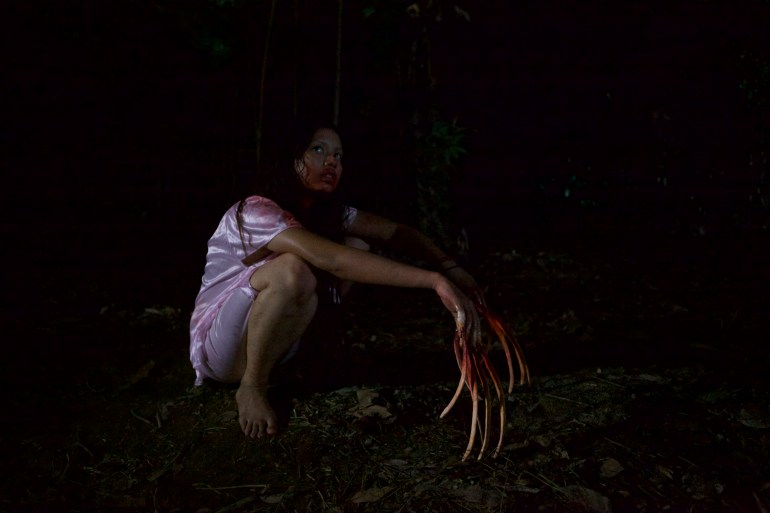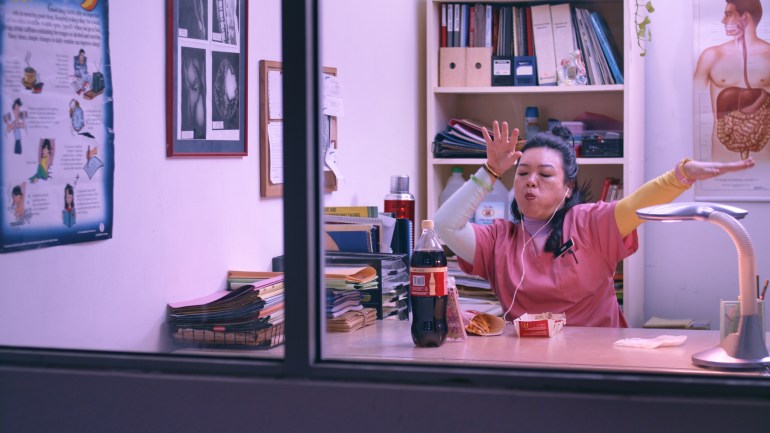Malaysian feminist body horror Tiger Stripes to debut at Cannes | Cinema News
Kuala Lumpur, Malaysia — For 12-year-old Zaffan (played by Zafreen Zairizal), going through puberty is literally a beast. When she discovers that her body is morphing in terrifying ways and her community sidelines her, Zaffan has no choice but to accept her true self, revealing her beauty, wrath and power to everyone
Amanda Nell Eu is reluctant to reveal too much of the plot of Tiger Stripes, but her debut feature mixes teenage body horror, and themes of female empowerment in a Southeast Asian setting and will make history this month as the first film directed by a Malaysian woman to debut at the prestigious Cannes Film Festival.
Tiger Stripes is the fourth Malaysian film and the first in 13 years, to be invited to Cannes after Kaki Bakar (The Arsonist, 1995) by U-Wei Saari, Karaoke (2009) by Chris Chong Chan Fui and The Tiger Factory (2010) by Woo Ming Jin.
It will compete for the Grand Prix at the 62nd Semaine de la Critique (International Critics Week), which will run from May 17 to 25 and is the programme dedicated to discovering first and second-feature filmmakers from around the world. It is where acclaimed directors like Wong Kar-wai, Guillermo del Toro, Ken Loach and Gaspar Noé all started.
“I’m so honoured. It’s what the team and I have been dreaming of. I don’t think anyone will be ready for it because it’s a real punch in the face,” Nell Eu, who is a Malaysian of mixed Chinese and British heritage, told Al Jazeera.
“Jokes aside, I hope Tiger Stripes’ themes and messages will resonate with many people and they will also enjoy the ride the film takes you on.”
Nell Eu had the idea for Tiger Stripes at the beginning of 2018 and did much of the development work over the following two years. “We did a lot of labs and workshops and then ended up going to international markets as well,” she said.
After the COVID-19 pandemic halted work on the project for about two years, the crew finally shot the film in 2022 in the wilds of Selangor state, east of Malaysia’s capital Kuala Lumpur. It stars veteran Malaysian actors Shaheizy Sam (Polis Evo 3, 2023), June Lojong (Roh, 2019), and Fatimah Abu Bakar (Imaginur, 2022), plus a trio of young and talented first-time actresses – Zafreen, Deena Ezral and Piqa, who play the three Malay girls from a rural community.

Produced by Foo Fei Ling for the independent Kuala Lumpur film company Ghost Grrrl Productions that she co-founded with Nell Eu, Tiger Stripes is a co-production between Malaysia, Indonesia, Singapore, Taiwan, France, Germany, the Netherlands and Qatar.
It was a decision that stemmed partly from knowing that the Film Censorship Board of Malaysia can be hard on creative works that touch on the multi-cultural nation’s most sensitive issues, from ethnicity to religion. Islam is Malaysia’s official religion and followed by more than half the population.
“As a filmmaker myself, I totally understand the problems of censorship and I really tried not to let that hinder me, especially in script writing and making the film,” said Nell Eu.
“Preserving the filmmaker’s vision, especially in a debut project, is always my primary mission as a producer,” said Foo. “Yet, producing a debut is not easy. That’s why we have co-productions with several other countries, so we can say as much as we want.”
Feminist body horrors
Nell Eu says she is obsessed with horror, feminism and female monsters – all themes Tiger Stripes share with her two previous short films. Her 2017 debut, Lagi Senang Jaga Sekandang Lembu (It’s Easier to Raise Cattle), premiered at the Venice International Film Festival and focused on the friendship between two teenage female outcasts in a remote village.
Her second short, Vinegar Baths (2018), tells the story of an overworked maternity ward nurse who is happiest when she roams hospital corridors at night and can finally eat. It won several festival awards, including Best Picture at the Scream Asia Horror Shorts competition.
“I’m a huge fan of body horror. I just find it fascinating,” Nell Eu told Al Jazeera, citing the genre’s stalwart Canadian director David Cronenberg and Shinya Tsukamoto, the Japanese director of the visionary Tetsuo: the Iron Man (1989), among her early influences.
“Creatively, I try hard to listen to my body more than my thoughts and when I make decisions, it is my gut feeling, how my heart feels, and what takes me towards something,” said Nell Eu.

The idea for Tiger Stripes developed from her memories of puberty, a time when the director says she “felt like such a monster” as her body changed and did not like anyone to look at her.
“I think that every human being has a fear of their own body at some point in their life. So yeah, in my dark sense of humour, what if the protagonist really turned into a monster?”
To achieve this vision, Tiger Stripes uses a lot of special effects, makeup and stage props in the tradition of old-school monster movies.
“The challenge is, that means five hours of application and that was very tricky, especially as we were shooting in a tropical climate, which is the absolute worst environment to do special effects and makeup,” said Nell Eu.
Zaffan’s body modifications were brought to life by a crew that includes experienced makeup artists like June Goh from Singapore, and Dutch artist Rogier Samuels, who also worked on international films such as the Lord of the Rings: Fellowship of the Ring, Border, and X.
“Just think of the challenge for [the actress] Zafreen, sweating inside, and when you remove the props, you see steam coming out… I am so impressed by her. She was so brave and into it. Her effort is truly amazing,” said Nell Eu.
Punk rock meets Asian monsters
The name of Tiger Stripes’s production company, Ghost Grrrl Productions, which Foo and Nell Eu founded together, pays homage to the feminist Riot Grrrl movement, a woman-empowerment-focused spin on the underground punk rock sub-culture that developed in the United States’s Pacific Northwest since the 1990s.
Its do-it-yourself, independent values inspired Nell Eu and Foo to pick the production’s teammates, make decisions and make “a film that I think is quite punk rock,” said Nell Eu.
Ghost Grrrl seeks to amplify the voices of strong, feared and misunderstood females in cinema, specifically from South East Asia. “We are both women, both very feminist, and we have a lot of beliefs in feminism and empowerment, and we also want to celebrate and include more diverse voices in the industry,” Nell Eu told Al Jazeera.
But what makes Tiger Stripes stand out from other female-driven horror films is its setting, which vehemently reclaims and questions the rich ghostly folklore of Nell Eu and Foo’s homeland.
“Growing up in Malaysia is almost like growing up with ghosts and you always hear ghost stories every night,” said Foo. “Even as a child, I watched horror movies from Hong Kong and Hollywood before going to sleep and the scariest monster was always female.”

Nell Eu says she is a big fan of the pontianak (or kuntilanak in Indonesian), the vampiric ghost of a woman who died during childbirth, which is found in the folklore of maritime South East Asia.
“To me, [the pontianak] is strong and powerful, the perfect embodiment of a feminist,” said Nell Eu. “I get inspired by these figures in our stories and culture and use them as an inspiration.”
But at the same time, the director is not trying to pigeonhole herself into any genre or trend, even though she is a fan of the new wave of South East Asian horror, especially films by Indonesian directors like Joko Anwar, Kimo Stamboel and Timo Tjahjanto, who are winning acclaim on subscription-based streaming services around the world.
Nell Eu says it is not her place to say where she fits in or whether Tiger Stripes will join that wave.
“I’ve always felt like this is a very personal story and from that personal feeling, it becomes universal. After the release, we’ll see what the feedback is and what people’s reactions are, so it’s a bit too early for me to tell.”
As she prepares for Cannes, Nell Eu is also in the early stages of planning a new feature film – a period drama set in the late 1930s, in pre-World War II colonial Malaya.
“I love that period, it was so colourful, and there was so much going on,” she said. “Rest assured, there will still be genre and there will still be blood.”


